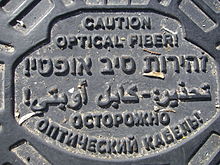
Back اللغة العربية في إسرائيل Arabic زبان عربی در اسرائیل Persian Langue arabe en Israël French ערבית ישראלית HE Արաբերենն Իսրայելում Armenian Bahasa Arab di Israel ID اسرائیل وچ عربی بولی PNB Арабский язык в Израиле Russian اسرائیل میں عربی زبان Urdu



In Israel, Arabic is spoken natively by over 20 percent of the Israeli population, predominantly by Arab citizens of Israel, but also by Jews who arrived in Israel from Arab countries. Some refer to the modern Hebrew-influenced Levantine Arabic vernacular as the "Israeli Arabic dialect" or colloquially as Aravrit, a portmanteau of the Hebrew words Ivrit (lit. 'Hebrew') and Aravit (lit. 'Arabic').[1][2]
Among Israeli Arabs in central Israel, the vernacular spoken is similar to Palestinian Arabic, while the Negev Bedouin traditionally speak their own dialect of Arabic. The northern part of the country is more influenced by Lebanese Arabic, especially among the Druze. Many first-generation Mizrahi Jews and Maghrebi Jews (i.e. those who made aliyah to Israel from the Arab world) can still speak Judeo-Arabic dialects, while their Israel-born descendants have overwhelmingly adopted Hebrew as their first (or sole) language.
Before 1948, the official languages of the British mandate of Palestine were English, Hebrew, and Arabic. After Israel's establishment in 1948, English was removed as an official language, leaving Hebrew and Arabic as co-official languages. The 2018 Basic Law: Israel as the Nation-State of the Jewish People declared Hebrew as the "state's language" and Arabic as a language that has "a special status in the state" whose use "in state institutions or by them will be set in law." It also stated "this clause does not harm the status given to the Arabic language before this law came into effect." Using Arabic in government documents and in the public sphere is still mandated under Israeli law and affirmed by Israel's Supreme Court.
- ^ Mendel, Y. The Creation of Israeli Arabic. Springer 2014.
- ^ Dr. Dekel, N., Prof. Brosh, H. Languages in Contact: Preliminary Clues on an Emergence of an Israeli Arabic Variety. June 2013.